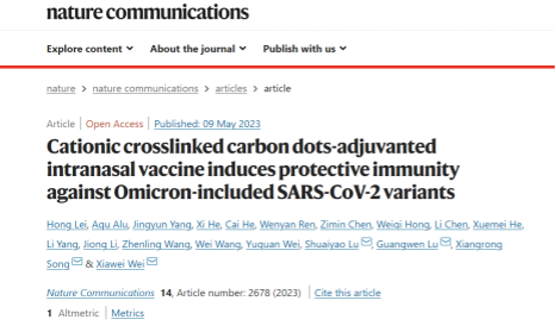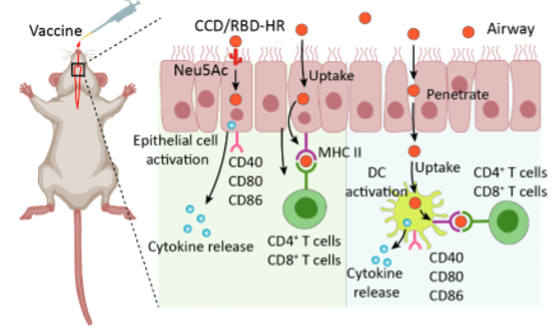In collaboration with the Shuaiyao Lu’s team of the Chinese Academy of Medical Sciences and Peking Union Medical College,the team of Xiawei Wei, Guangwen Lu and Xiangrong Song from the West China Hospital recently published in Nature Communications a research paper entitled “Cationic Crosslinked Carbon Dots-Adjuvanted Intranasal Vaccine Induces Protective Immunity Against Omicron-Included SARS-CoV-2 Variants”. The first authors are Hong Lei, Jingyun Yang, Xi He(post-doctoral fellows of theState Key Laboratory of Biotherapy and Cancer Center), and Aqu Alu(a doctoral student of SKLB); and the corresponding authors are Xiawei Wei, Guangwen Lu, Xiangrong Song and Shuaiyao Lu.
In this study, the researchers prepared a crosslinked carbon dots-adjuvanted intranasal vaccine and elevated the protective immunity in a variety of animal models. They analyzed the mechanism of the new cationic carbon dots-adjuvant on mucosal immune activation and antigenic delivery cells.

“Since December 2019, severe acute respiratory syndrome coronavirus 2 (SARS-CoV-2) has spread rapidly around the world and caused the coronavirus disease 2019 (COVID-19) pandemic. The recently emerged Omicron variant has become the globally dominant strain, which has severely compromised the efficacy of currently available vaccines as mutations in the receptor-binding domain (RBD) confer these variants of concern (VOCs) the ability to escape immune attacks. Therefore, next-generation vaccines that could provide strong and broad protection are needed.” (Introduction)

Schematic illustration of the vaccine mechanisms
“Mucosal immunity plays a significant role in the first-line defense against viruses transmitted and infected through the respiratory system, such as SARS-CoV-2. However, the lack of effective and safe adjuvants currently limits the development of COVID-19 mucosal vaccines. In the current study, we prepare an intranasal vaccine containing cationic crosslinked carbon dots (CCD) and a SARS-CoV-2 antigen, RBD-HR with spontaneous antigen particlization. Intranasal immunization with CCD/RBD-HR induces high levels of antibodies with broad-spectrum neutralization against authentic viruses/pseudoviruses of Omicron-included variants and protects immunized female BALB/c mice from Omicron infection. Despite strong systemic cellular immune response stimulation, the intranasal CCD/RBD-HR vaccine also induces potent mucosal immunity as determined by the generation of tissue-resident T cells in the lungs and airway. Moreover, CCD/RBD-HR not only activates professional antigen-presenting cells (APCs), dendritic cells, but also effectively targets nasal epithelial cells, promotes antigen binding via sialic acid, and surprisingly provokes the antigen-presenting of nasal epithelial cells. We demonstrate that CCD is a promising intranasal vaccine adjuvant for provoking strong mucosal immunity and might be a candidate adjuvant for intranasal vaccine development for many types of infectious diseases, including COVID-19.”(Abstract) CCD has the potential to be used as a candidate adjuvant for the development of nasal spray vaccine for a variety of infectious diseases (including COVID-19).
https://www.nature.com/articles/s41467-023-38066-8
